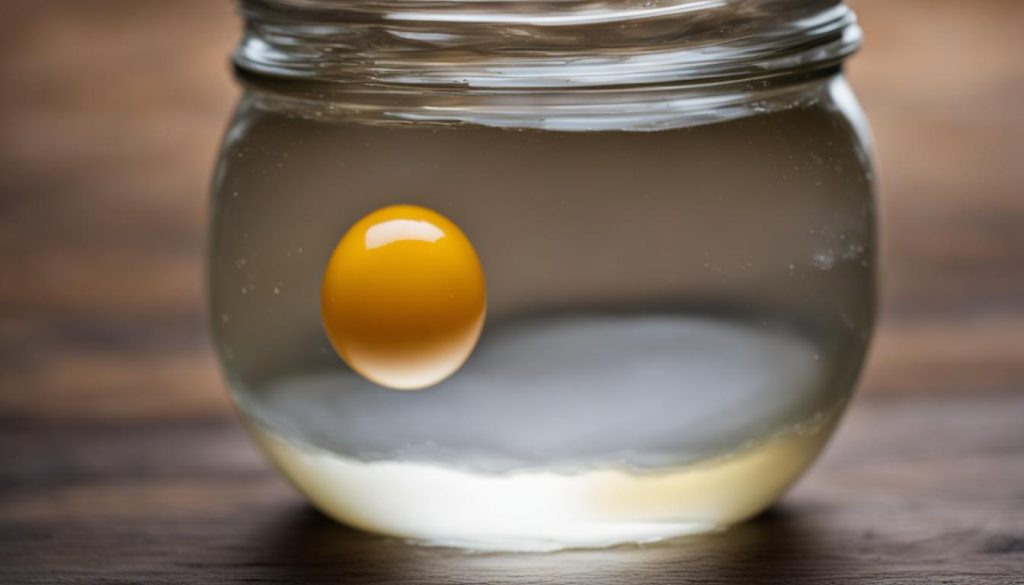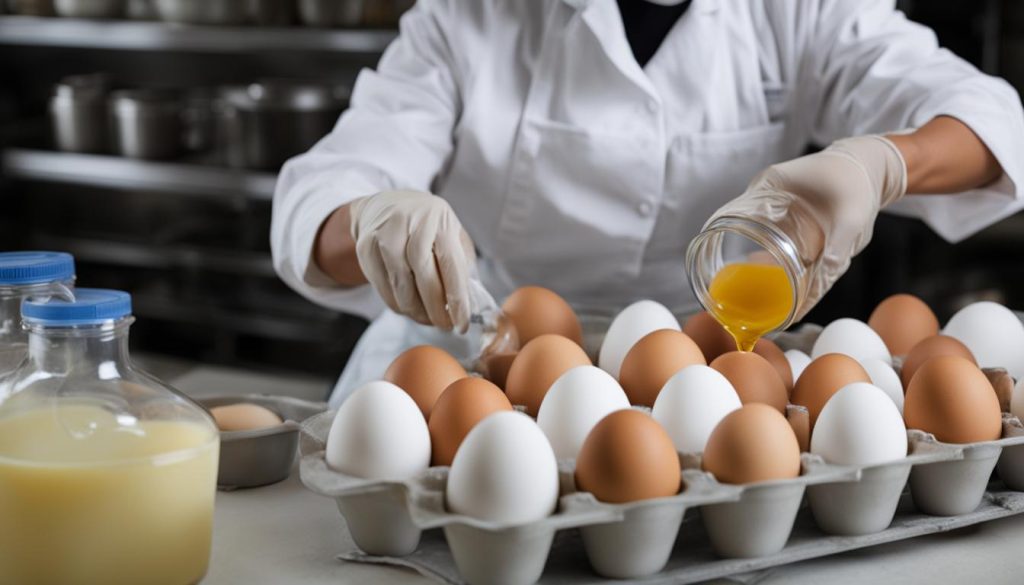Did you know that water glassing, an ancient preservation technique, can extend the shelf life of eggs to up to 18 months? That’s right, by using a simple solution made with calcium hydroxide (pickling lime), eggs can be preserved and stored for a remarkably long time. In this article, we will explore the art of egg preservation, including water glassing, alternative methods, and practical tips for ensuring egg freshness.
Key Takeaways:
- Water glassing is an age-old method of preserving eggs using a lime solution.
- Water-glassed eggs can be stored in a cool, dark place for up to 18 months.
- Alternative methods for preserving eggs include freezing, dehydrating, and using mineral oil.
- Proper storage and handling techniques are essential for maintaining egg freshness.
- Experiment with different preservation methods to find what works best for you.
Does Water Glassing Change the Taste and Texture of Eggs?
Water-glassed eggs have a slightly different taste and texture compared to fresh eggs, but the difference is subtle and may not be noticeable to everyone. Some people describe the taste as richer and more savory, and the texture may be slightly firmer when cooked. However, water-glassed eggs can still be used in all the same ways as fresh eggs, including scrambled eggs, omelets, and baking recipes. The taste and texture may vary depending on the storage conditions, but overall, water-glassed eggs are a viable option for preserving eggs without compromising their quality.
“Water-glassed eggs have a slightly different taste and texture compared to fresh eggs, but the difference is subtle and may not be noticeable to everyone.”
How to Water Glass Eggs: Step-by-Step Guide
To water glass eggs, you will need a storage container, food-grade hydrated lime, clean, unwashed eggs, and water. Follow these step-by-step instructions to preserve your eggs using the water glassing method:
- Choose a suitable storage container, such as a glass jar or food-grade bucket, that can accommodate the number of eggs you want to preserve.
- Ensure the container is clean and sanitized before use to prevent any contamination.
- Measure out the desired amount of food-grade hydrated lime. The recommended ratio for the water-glassing solution is 1 ounce of lime per quart of water.
- In a separate container, mix the hydrated lime and water until the lime is fully dissolved. This solution acts as a preservative for the eggs.
- Carefully place the clean, unwashed eggs into the storage container. Make sure not to overcrowd them, leaving enough space for the lime-water solution to cover each egg.
- Pour the lime-water solution over the eggs, ensuring they are completely submerged. The solution forms a protective coating around the eggs, sealing the shells and preventing bacterial contamination.
- Seal the container tightly to prevent air and moisture from entering. This will help maintain the quality and shelf life of the water-glassed eggs.
- Store the container in a cool, dark place with a consistent temperature. The ideal storage temperature for water-glassed eggs is between 32°F (0°C) and 45°F (7°C).
- Allow the eggs to sit in the lime-water solution for the recommended period, which is up to 18 months.
- When you are ready to use the water-glassed eggs, remove them from the storage container and rinse them under water to remove any traces of the lime solution.
- You can now use the water-glassed eggs in your favorite recipes, just like fresh eggs!
Water glassing eggs is a straightforward preservation method that can help extend the shelf life of your eggs and ensure a constant supply. Follow the step-by-step guide above to successfully preserve your eggs using the water glassing technique.
Best Practices for Water Glassing Eggs
Preserving eggs through the water glassing method requires careful adherence to safety precautions and best practices to ensure optimal results. By following these guidelines, you can effectively preserve your eggs for an extended period while maintaining their quality and freshness.
Clean, Unwashed Eggs
When water glassing eggs, it is crucial to use clean, unwashed eggs for preservation. Washing the eggs can remove the protective bloom coating that naturally covers the shell and compromises the preservation process. By preserving unwashed eggs, you can maintain the integrity of the eggshell and ensure the preservation solution can work effectively.
Food-Grade Hydrated Lime
When preparing the water-glassing solution, it is essential to use food-grade hydrated lime, also known as pickling lime. Food-grade hydrated lime is safe for consumption and provides the necessary alkaline environment to prevent bacterial contamination and prolong the shelf life of the eggs.
Proper Storage Conditions
After immersing the eggs in the water-glassing solution, it is crucial to store them in appropriate conditions to maintain their quality. Store the water-glassed eggs in a cool, dark place that is away from direct sunlight and heat sources. This helps to prevent temperature fluctuations that could affect the longevity of the preserved eggs.
Regular Spoilage Checks
Regularly checking the water-glassed eggs for signs of spoilage is essential to ensure their safety and freshness. Inspect the eggs for any visible signs of mold growth, foul odor, or abnormal discoloration. If any eggs appear rotten or spoiled, discard them immediately to prevent contamination of the remaining preserved eggs.
Avoid Using Damaged Eggs
It is recommended to avoid using eggs with cracks or other damages to the shells when water glassing. Damaged eggs are more vulnerable to bacterial contamination and can compromise the preservation process. Only select eggs with intact shells to ensure the highest level of safety and effectiveness.
By following these best practices for water glassing eggs, you can safely and effectively preserve your eggs for an extended period. These guidelines help ensure proper egg storage and minimize the risk of spoilage and contamination. Whether you use preserved eggs for cooking or emergency food supplies, water glassing provides a reliable method for extending the shelf life of this versatile and essential food source.
Alternative Methods for Preserving Eggs
If water glassing eggs doesn’t suit your preferences or available resources, there are other methods for preserving eggs. Freezing eggs is a simple and convenient option. You can freeze eggs by lightly scrambling them and pouring them into ice cube trays or muffin tins. Dehydrating eggs is another method, but it’s important to fully cook the eggs before dehydrating to eliminate the risk of food poisoning. Some people also use mineral oil to preserve eggs, coating them in food-grade mineral oil and storing them in a cool place. Additionally, you can freeze-dry eggs using a freeze dryer, which allows for long-term storage of both raw and cooked eggs. Hard-boiled eggs can also be preserved by storing them in the refrigerator for up to a week.
If you’re looking for an alternative to water glassing, freezing eggs is a popular method. By lightly scrambling the eggs and pouring them into ice cube trays or muffin tins, you can create convenient portions of frozen eggs. This method is particularly useful if you have an excess supply of eggs that you want to preserve for future use. To use the frozen eggs, simply thaw them in the refrigerator overnight or in the microwave using the defrost setting.
Dehydrating eggs is another option for long-term storage. However, it’s important to fully cook the eggs before dehydrating them to eliminate the risk of food poisoning. Once cooked, scramble the eggs and spread them in a thin layer on a dehydrator tray. Set the dehydrator to a low temperature and dry the eggs until they are crispy and brittle. Store the dehydrated eggs in an airtight container in a cool, dark place.
Another alternative method is to use mineral oil to preserve eggs. Coat the eggs in food-grade mineral oil, which creates a barrier that seals the eggshell and prevents air from entering. This method is commonly used for long-term storage, and the eggs can be stored in a cool place away from direct sunlight.
For those with access to a freeze dryer, freeze-drying eggs is an excellent option. Freeze-drying preserves the eggs’ flavor, texture, and nutritional value while allowing for long-term storage. The freeze dryer removes moisture from the eggs, resulting in a lightweight and shelf-stable product that can be rehydrated when needed.
Lastly, hard-boiled eggs can also be preserved. By storing them in the refrigerator, you can extend their shelf life to up to a week. Hard-boiled eggs make a convenient snack or can be used in various recipes, making them a versatile option for preserving eggs.
| Preservation Method | Pros | Cons |
|---|---|---|
| Freezing | – Convenient – Easy to use – Maintains taste and texture |
– Requires freezer space |
| Dehydrating | – Long-term storage – Lightweight – Minimal space needed |
– Requires cooking eggs beforehand – Time-consuming process |
| Mineral Oil | – Long-term storage – Preserves freshness |
– Requires careful handling – Need for food-grade mineral oil |
| Freeze-drying | – Retains flavor and texture – Long-term storage |
– Requires a freeze dryer |
| Hard-boiled eggs | – Easy to prepare – Convenient for snacks or recipes |
– Shorter storage life compared to other methods |
Tips for Proper Egg Storage and Handling
Proper storage and handling of eggs are crucial for maintaining their freshness and quality. Here are some tips to ensure your eggs stay fresh and safe for consumption:
1. Choose the Right Storage Location
Store your eggs in a cool, dark place, such as a pantry or root cellar. Avoid storing them near strong-smelling foods, as eggs can absorb odors easily. Keeping them away from direct sunlight and heat sources is essential for preserving their freshness.
2. Use the Appropriate Storage Method
If you have water-glassed eggs, it’s important to store them in an upright position with the small end facing down. This helps prevent the air pocket from expanding, keeping the eggs fresh for a longer period. For other types of eggs, such as fresh eggs or hard-boiled eggs, store them in their original cartons or a covered container to maintain their quality.
3. Rotate Your Egg Stock
To prevent eggs from going bad, make sure to use the oldest eggs first. Implement a rotation system by placing newly purchased eggs at the back of the storage area, pushing older ones forward. This way, you’ll always have fresh eggs on hand.
4. Avoid Washing Eggs Until Ready to Use
Washing eggs before storage is not necessary. The protective bloom coating on the eggshell helps keep out bacteria and maintains the egg’s freshness. Only wash the eggs just before using them to avoid compromising their preservation process.
5. Properly Wash Water-Glassed Eggs
When using water-glassed eggs, it’s crucial to wash them thoroughly before consumption. This helps remove any traces of hydrated lime used in the preservation process. Rinse the eggs under cool running water and gently rub the surface to ensure all residue is removed.
Follow these tips to ensure that your eggs stay fresh, safe, and delicious for longer periods. By properly storing and handling your eggs, you can enjoy their goodness in various recipes and dishes.
Conclusion
Preserving eggs is a practical way to extend their shelf life and ensure a steady supply throughout the year. One effective method is water glassing, which uses hydrated lime to seal the eggshells and prevent bacterial contamination. Water glassing can provide up to 18 months of extended shelf life while preserving the taste and texture of the eggs. However, there are also alternative methods for preserving eggs, such as freezing, dehydrating, or using mineral oil.
Proper storage and handling techniques are crucial for maintaining egg freshness. Storing eggs in a cool, dark place and rotating your egg stock are essential steps to preserve their quality. By experimenting with different preservation methods and following proper storage practices, you can enjoy farm-fresh eggs for an extended period.
For more information on what to do with all these eggs, check out this comprehensive guide. It provides practical tips, detailed instructions, and additional insights into egg preservation methods. Preserve your eggs using the method that works best for you and enjoy their freshness throughout the year.


